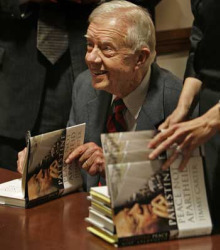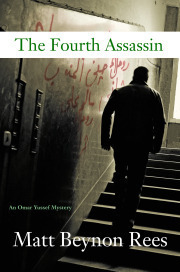Matt Rees's Blog - Posts Tagged "washington"
Inventing the Palestinian detective
 The dead man's mother raged and wept as she told me how she’d discovered her son’s body, in the cabbage patch outside her home. She’d gone down on her knees, she said, touched his blood and wiped her fingers on her face, calling out that God is most great.
The dead man's mother raged and wept as she told me how she’d discovered her son’s body, in the cabbage patch outside her home. She’d gone down on her knees, she said, touched his blood and wiped her fingers on her face, calling out that God is most great.As the winter wind came cold off the Judean Desert, I watched her tears and thought: “I have to write a novel about this.”
Forgive me if that sounds callous, but I’m a writer. Or, I should say, that’s the moment when I became a writer.
I was Time Magazine’s Jerusalem bureau chief, covering the violence of the Palestinian intifada, when I went to that bereaved mother in her village on the edge of Bethlehem in 2002. I had always written fiction, but only published a few short stories. In the midst of the despair that engulfed Israelis and Palestinians, I found the very thing that could make me happy – the material for my series of Palestinian crime novels.
The killing of that woman’s son as he crept home in the dark was the basis for the opening death in my first novel “The Collaborator of Bethlehem.” The book won a Crime Writers Association Dagger. Since then I’ve published two more crime novels set in the Palestinian towns.
They’re a response to the emotional questions that, as a journalist, I was never able to answer. Strangely, fiction proves to be a better way to understand extreme events than journalism.
Since the first time I set foot in the West Bank in 1996, I had grown disillusioned with the ability of journalism to convey the depth of what I learned about the Palestinians. Back then, I visited the family of a Nablus man tortured to death in one of Yasser Arafat’s jails. The news article I wrote was a good one, uncovering the internal Palestinian violence so often overshadowed by the more spectacular conflict with Israel. But my impressions were much deeper.
I was struck by the candor and dignity with which the dead youth’s family spoke to me; the sheer alien nature of the place thrilled me. At the entrance to the family’s house in the casbah, an old oil drum held black flags and palm fronds, symbols of Islamic mourning. Men sat around smoking under a dark awning. I felt a powerful sense of adventure, as though I had uncovered an unknown culture.
The lawlessness of Palestinian life also gave me great characters for my fictionalized good guys. But also the villains. Unfortunately there are many Palestinians who have strong motivations to kill each other. I’ve spent a lot of time over the years with some of these men, trying to learn why they take the path of violence—time that has led to a deeper characterization of the villains in my books.
With my new novel, “The Fourth Assassin,” I brought my sleuth Omar Yussef to New York because I wanted him to confront the most important issue of the last decade – an issue which is crystallized in its most horrifically concrete form in the city of 9/11.
It’s a natural progression for a series that began in the cabbage patch near Bethlehem. When I stood there, it was seven months after the attacks on New York and Washington. The questions posed to anyone thinking about the Middle East had just become so much more complex. Too complex and emotional for journalism to encompass them and, all these years later, for politicians, too.
Whether it’s a single sniper’s bullet cutting through the chest of a man outside his mother’s house or a jetliner bursting through a 110-story building, my novels are aimed at the most explosive points in our recent history. That’s why I simply had to write them.
(I posted this on a joint International Crime Authors blog I write with three other writers. Check it out.)
Published on February 24, 2010 22:49
•
Tags:
9-11, assassination, bethlehem, blog, brooklyn, crime-fiction, journalism, judean-desert, middle-east, new-york, omar-yussef, sniper, the-collaborator-of-bethlehem, the-fourth-assassin, time-magazine, united-nations, washington, west-bank, yasser-arafat
Jimmy Carter, apartheid, hemorrhoids and Matt Beynon Rees
 I often receive emails from book stores, amazon.com, Barnes and Noble, and online literary sites telling me how much I’d like the novels of Matt Beynon Rees. I’m delighted to see these emails, which are based on my other purchases and interests, as only I can truly know just how much the novels of Matt Beynon Rees have changed my life. (Try them, I’m sure you’ll agree.)
I often receive emails from book stores, amazon.com, Barnes and Noble, and online literary sites telling me how much I’d like the novels of Matt Beynon Rees. I’m delighted to see these emails, which are based on my other purchases and interests, as only I can truly know just how much the novels of Matt Beynon Rees have changed my life. (Try them, I’m sure you’ll agree.)Of course, I also get the occasional email informing me that if I like Matt Beynon Rees, I might also enjoy another author named in the email. Well, they’re half-way there, because of course I DO like Matt Beynon Rees. No ifs. So I always have to look to see if they’re right about the second part.
The links are sometimes obvious – “if you like Matt Beynon Rees, try [insert crime novelist’s name here:]” – and occasionally baffling though thought-provoking. I had one a few weeks back suggesting fans of Matt Beynon Rees’s Palestinian crime series would really dig a nonfiction book about a cyclone that hit Burma in 2008.
The latest of these connections was no doubt the most bizarre. I clicked on an email from an online book blog a few days ago: “If you like Matt Beynon Rees, we think you’ll enjoy Jimmy Carter.”
Wow, I thought, how did they know that I, too, have lusted after women in my heart.
It could be that the connection was the result of the review of the paperback version of my third Palestinian crime novel THE SAMARITAN’S SECRET in The New York Times—it was featured in the same column as a review of the softcover edition of the 39th President’s ultra-controversial 2006 work of nonfiction “Palestine – Peace Not Apartheid.”
Now here’s where I part with the “If you like Matt Beynon Rees, we think you’ll enjoy Jimmy Carter” email. Of you like Matt Beynon Rees, you’ll probably enjoy crime fiction. Or just fiction. Rather than “Palestine – Peace Not Apartheid,” in which the loveable old peanut farmer from Georgia accuses Israel of the worst kind of discrimination against Palestinians in the West Bank.
I don’t have an opinion on Jimmy’s book. I never read it. It has “Palestine” in the title and, as Graham Greene wrote, once one has lived in a place for a while one ceases to read about it.
Also it has “Apartheid” in the title. I have an opinion about what Israel does in the West Bank. I’m not going to get into it here, but in a (pea)nutshell, I think it’s a mistake to compare Israeli policy to apartheid, because then the debate shifts to the similarities and differences between South Africa’s old regime and Israel’s occupation – instead of talking simply about what Israel does and what’s wrong with it.
As soon as Smiling Jim put “apartheid” in his title, his book’s content was largely ignored. Pro-Israel mouthpieces could condemn him as an anti-Semite simply for comparing Israel to the unlamented and certifiably pariah regime in Pretoria. Game over. Jimmy even issued an apology a couple of years ago to all Jews on Yom Kippur. As though saying something critical of Israel is somehow a criticism of all Jews. As though there weren’t any Jews who agreed with him about Israel’s policy toward the Palestinians. Game over with a slamdown.
For me, as for many others, Carter has been a mildly useful voice for decency in the world. Though he also represents something a little pitiful, as one might witness in the song “Jimmy Carter” by my favorite band, Detroit whacksters Electric Six:
“Like Jimmy Carter,
Like electric underwear,
Like any idea that never had a chance of going anywhere….”
However, the decisive element in the question “If you like Matt Beynon Rees, we think you’ll enjoy Jimmy Carter” is a matter of personal animus. In fact, it’s a family insult suffered by the Rees’s of 32 Neath Road, Maesteg, Mid-Glamorgan, Wales, at the hands of James Earl Carter Jr., 1600 Pennsylvania Avenue, Washington, D.C.
My grandfather Tom Rees read in the Western Mail that then-President Carter was suffering from hemorrhoids. Tom had faced the same ailment some years before and had found nothing eased the feeling of defecating broken glass, until he switched to Allinson’s wholewheat bread. He wrote a letter to the White House in his careful cursive script, letting the leader of the Free World know what he needed to do to poop painlessly.
He didn’t expect any public recognition. But he assumed he’d get a polite note.
Perhaps Carter’s people knew that my grandfather was a former Communist Party member and figured the brown bread was a plot of some sort to keep the Commander-in-Chief on the can and away from the nuclear button, while the Reds swarmed Capitol Hill. In any case, the President never wrote back. Not even a “President Carter has read your inquiry with interest, but regrets that he will not be able to make it part of United States planning and policy at this time, though he is sympathetic to your cause.”
My grandfather continued to consume wholewheat bread, even at a time (the 1970s) when those around him considered it to be a strange fad akin to today’s no-nightshades tomato-free diets.
That’s why I don’t like Carter. Not because of apartheid. Because of hemorrhoids.
I wonder if Jimmy ever got them cured. Maybe he mentions it in his book. Perhaps I ought to read it after all…
Published on May 20, 2010 06:43
•
Tags:
amazon-com, apartheid, barnes-and-noble, crime-fiction, detroit, electric-six, fiction, georgia, glamorgan, graham-greene, hemorrhoids, israel, jews, jimmy-carter, maesteg, matt-beynon-rees, middle-east, new-york-times, palestine, palestine-peace-not-apartheid, palestinian, pennsylvania-avenue, pretoria, south-africa, the-samaritan-s-secret, wales, washington, west-bank, white-house, yom-kippur
Omar Yussef predicted Cairo and Tunis
 If you’ve been wondering why the people of Tunisia and Egypt have risen up against their dictators and why it caught Washington with pants down, it’s because you didn’t read THE FOURTH ASSASSIN, the latest of my Palestinian crime novels.
If you’ve been wondering why the people of Tunisia and Egypt have risen up against their dictators and why it caught Washington with pants down, it’s because you didn’t read THE FOURTH ASSASSIN, the latest of my Palestinian crime novels.In THE FOURTH ASSASSIN, which was published exactly a year ago, my Palestinian sleuth Omar Yussef travels to New York for a conference at the UN. While there, he uncovers an assassination plot. But he also has to address the conference about the life of ordinary Palestinians —— and the people of other Arab countries.
Here’s a passage from that chapter of the book, with Omar addressing the delegates from Arab countries and the Americans:
“ ‘It may be hard for you to understand, but what ordinary Palestinians want and what they battle for every day is precisely what’s denied to most of your citizens in the Arab countries: freedom and economic prosperity.’
The Libyan delegate removed his finger from his nose and flicked it angrily. The Syrian strode down from the rear of the hall, dropping his
cigarette. The Lebanese stepped out the butt on the carpet as he followed.
‘How can you, the Arab countries, dictate a solution for the Palestinians, when you suffer from many of the same problems? In fact, you, the governing class, thrive on the lack of democracy, the inequality of wealth. Take away the Israeli occupation and the Palestinians would be closer to freedom and a functioning economy than most of your peoples.’
Read the rest of this post on my blog The Man of Twists and Turns.
Published on February 02, 2011 01:00
•
Tags:
bashar-assad, brooklyn, cairo, crime-fiction, egypt, middle-east, new-york, omar-yussef, politics, syria, the-fourth-assassin, tunis, united-nations, washington



